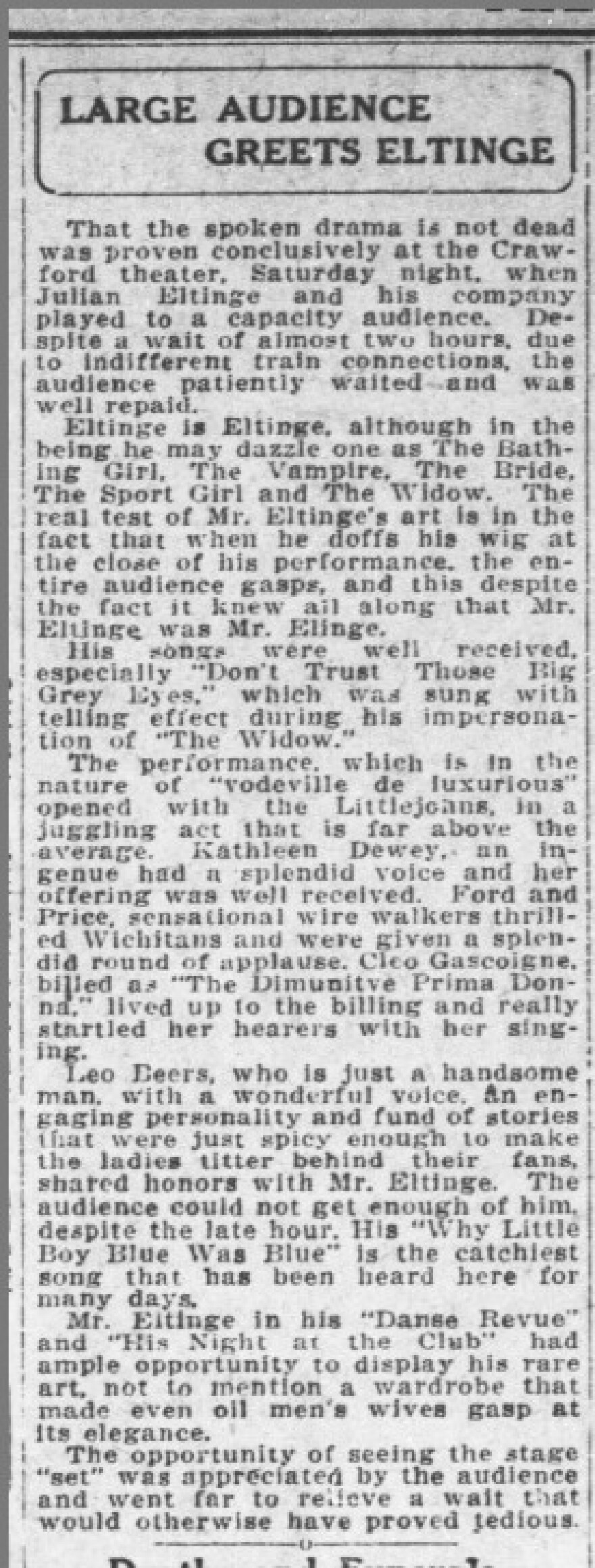In the darkened Roxy’s Downtown theater, a drag queen struts to the center of the stage in a sparkling silver halter dress and matching fingerless gloves.
As the Pussycat Dolls’ “Hush Hush” begins to play, the brunch crowd begins to cheer. Because as her hot-pink over-the-knee boots and purple wig make clear, Imani KO Kotoure's performance packs a big punch.
“I'm a very big fan of Marvel Comics,” said Justice Jermaine Thomas, who performs as Imani onstage. “So I always loved the very beautiful but strong female lead. Like they’re beautiful, but they’re dangerous. And so Imani is all of that.”
That’s why Imani’s middle name is KO — for knockout.
“She is so much beauty, but she's also going to do a high kick or do a backflip or just do something in heels that you don't expect,” Justice said.
But right now, drag has become a flashpoint in the culture wars — drawing performers like Justice into a legislative debate on gender identity and personal expression. Nationwide, conservative legislators have tried to link drag to the sexualization of children, an assertion drag performers and members of the LGBTQ+ community say is untrue and manipulative.
Since January, Kansas legislators have introduced two bills that would regulate or criminalize drag performances at which minors are present. Similar bills have popped up in more than a dozen states around the country. In early March, Tennessee passed a bill to restrict drag performances in public places.
Some performers feel the avalanche of legislation is a bullying tactic — and that the restriction of certain drag performances creates a slippery slope toward regulating peoples’ gender identities and banning drag entirely.
“It strikes fear into you because it's just like, what would I do if just being myself was a crime?” Justice said.
Justice, 25, was born male but identifies as nonbinary and uses they/them pronouns. In high school, Justice described themself as flamboyant and outgoing, performing as a yell leader on the cheer team.
One day after graduation, a friend invited Justice to a drag show — an event that turned out to be life-changing. Through drag, Justice started exploring their gender identity, personality and performance skills.
“It’s just really amazing to see my friend grow,” said Jaci Ignudo, a friend of Justice since high school. “Seeing this transformation of them as a performer beyond cheer and dance, and getting to see this new personality … where she is so confident and expressive, I think it’s just so beautiful to see.”
But the current nationwide rhetoric around drag reminds Justice of times in the past they had to hide their identity.
“It makes you angry to feel as though everything that you've already overcome to be in this place that you are in, you're going to have to go back through that,” Justice said.

Drag in the Midwest dates back to the early 20th century
Drag is difficult to define. But it’s usually marked by an over-the-top performance of femininity or masculinity, many times by someone of the opposite gender. Having a drag persona does not mean that a performer is transgender, though some are.
Stuart Hinds — co-founder of the Gay and Lesbian Archive of Mid-America at the University of Missouri Kansas City — said the entertainment style has been around for more than a century in the Midwest.
“In the 19th century … there were laws passed all across the country that prohibited appearing in public in clothing that wasn't appropriate for your gender,” Hinds said. “At the same exact time, you have entertainers who are celebrated for doing the exact same thing.”
Newspaper clippings from Wichita show this trend. An 1895 article noted that two young Wichita men were arrested for attending the theater in female attire.

At the same time, “female impersonators” performed on-stage for clamorous Wichita crowds as Vaudeville grew from the 1880s through the 1920s. One such artist was Julian Eltinge, who wore feminine clothes and makeup on stage.
A 1919 Wichita Eagle article reviewed Eltinge’s performance at the former Crawford Theater on Topeka Street, noting that his wardrobe “made even oil men’s wives gasp at its elegance.”

But Hinds said that increased scrutiny of nightclubs accompanied the end of Prohibition in 1933 — which meant less drag.
“It's like any sort of social purity movement,” Hinds said. “They're effective for a brief while and then people get distracted by other things. … And so the spotlight tends to fade and the energy that's put behind this kind of oppression tends to dissipate a little bit. And so things tend to relax and go back to the way they were.”
Drag as it’s known today
After efforts to smother drag at the end of Prohibition, Hinds said it returned en masse around the 1960s and ’70s. It roughly coincided with the Stonewall uprising, protests by the gay community in New York City that are considered a transformational moment for LGBTQ rights.
“It’s really after World War II and into the ’60s that the connection between drag … and gay bars, the gay community, really becomes more firmly established,” Hinds said.
Wichita was no exception, according to Kelley Hoffman, the former owner of a Wichita gay bar.
“I’m 61 now. But at age 14 and 15, I used to sneak over to a little club on Pawnee called the Bus Station,” Hoffman said.
The Bus Station was a gay bar in Wichita with dancing and — about once a month — performances by a drag queen named Hollywood. Hoffman grew up in Hutchinson, so the bar was an outlet for her as a teen in the 1970s.
“Being gay in a small city really kind of sucked,” Hoffman said. “And so … it just showed that there was a bigger world out there and that things were OK. And when I got older I could leave and go to the OK-land.”
When Hoffman moved to Wichita after high school, she started working as a DJ at the Fantasy Complex, a gay bar. She grew close with the drag queens who performed there, saying they dealt with harassment from the police at the club.
In 2005, Hoffman became one of Fantasy’s owners. Under her leadership, drag queens remained a central part of the club.
“You can sense underneath that they’ve all had some sort of a struggle,” Hoffman said. “And I've always respected and loved that struggle. And that’s one of the reasons I've always loved and respected drag queens.”
Fantasy closed in 2015. But in the time since Hoffman began sneaking over to the Bus Station, drag had been transformed into a mainstream staple. Drag pageants became popularized, with RuPaul’s Drag Race entering pop culture as a beloved television show.
During the AIDS crisis, drag queens assumed the role of community fundraisers: An iconic Wichita drag queen known as Fritz Capone raised more than $100,000, according to the Wichita Eagle.
Today in Wichita, drag performances are now a staple at clubs, theaters and brunches. The Wichita Public Library even put on a drag queen story hour in 2018, an event that drew significant backlash.

Brad Thomison performed as drag queen Divinity Masters at the library’s story hour. Since then, Thomison has seen backlash to his art grow.
He said that on social media, it’s easy to ignore. But in person, it can be scarier.
“When there are real threats of harm, when you may be outnumbered, you begin to just look around a little bit to see if this is worth fighting or not,” Thomison said. “And most of us who are used to fighting maybe don't look hard enough.”
Justice — Imani KO Kotoure — is scared, too. At just 25, they have much of their life left to live. Bigger markets, like Kansas City, boast more booking opportunities for queens. Justice has considered leaving Wichita, their hometown.
But Justice said moving won’t escape the legislation targeting drag.
“It’s going to spread. … It's like cancer,” Justice said. “I don't think there's any way to avoid it, unfortunately. It's coming, and we just got to figure out how we are going to react.”
Onstage, though, Justice isn’t scared. After all, Imani KO Kotoure is practically a superhero.


